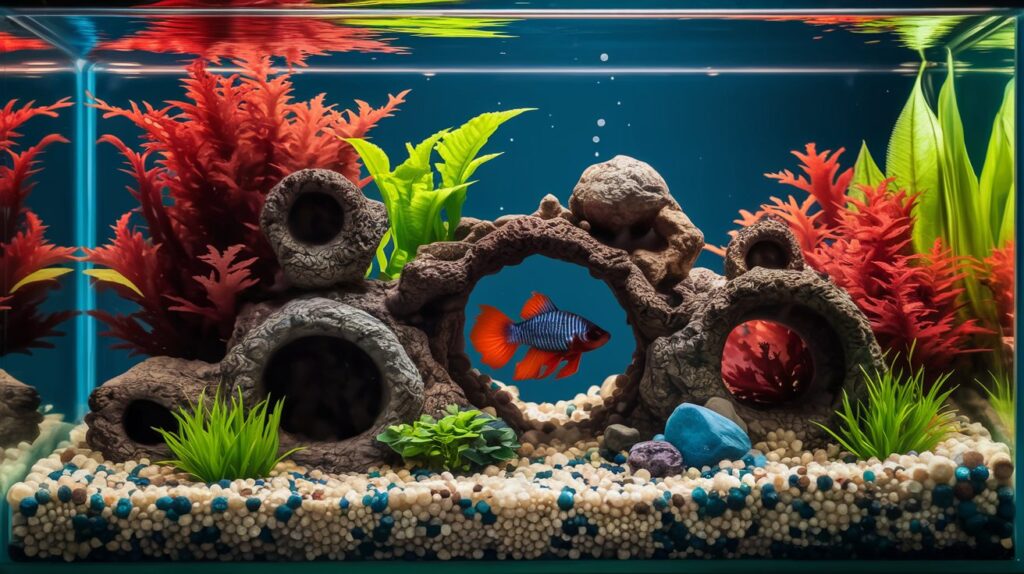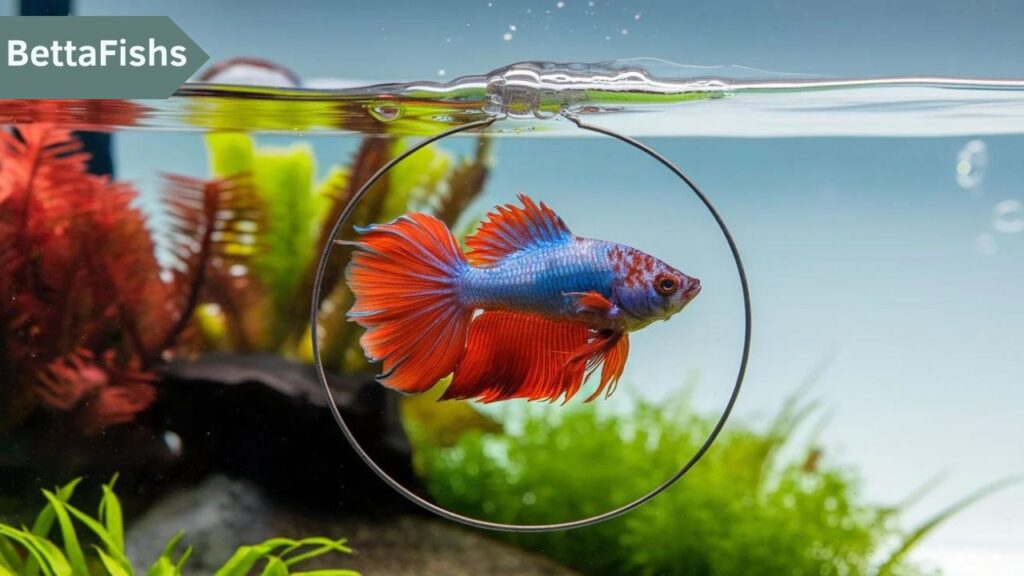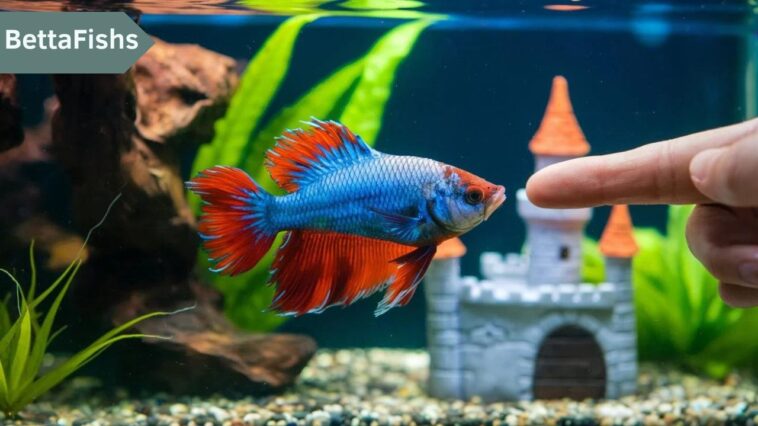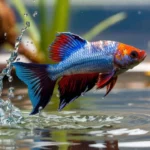Siamese fighting fish also referred to as betta fish, are prized for their distinct personalities and vivid colors. These little swimmers are a popular choice for pet owners due to their relatively low maintenance needs and captivating behavior. But did you know that you can actually train your betta fish to perform tricks? That’s right! Training your betta fish can be a fun and rewarding experience for both you and your aquatic friend. In this article, we’ll dive into ” How do you train a Betta fish? “, exploring techniques, tips, and tricks to get you started on this exciting journey.
Betta Fish
Before you start training your betta fish, it’s important to understand their natural behavior and individual personality. Betta fish are naturally curious and intelligent creatures. They often interact with their environment and can even recognize their owners. Observing your betta’s behavior will help you identify what motivates them, making training much more effective.
Why Train Your Betta Fish?
Training your betta fish has numerous benefits. Not only does it provide mental stimulation for your fish, keeping them active and engaged, but it also strengthens the bond between you and your pet. Training can be a way to establish a routine and give your betta fish a sense of purpose, which can improve their overall well-being. Plus, who wouldn’t want to show off their fish’s cool tricks?
Getting Started with Betta Fish Training
To begin training your betta fish, you need to set the right environment. Make sure your fish tank is clean and spacious enough for your betta to move around comfortably. You’ll also want to gather some training tools, such as a small mirror, a hoop, or a stick. The key is to have items that can serve as training aids without stressing out your fish.
Training Techniques for Betta Fish
Betta fish training is all about positive reinforcement. This means rewarding your fish when they perform a desired action. One of the easiest ways to motivate a betta fish is through food. Betta fish love treats, so using food as a motivator can be very effective. Start with simple commands and reward your fish immediately after they perform the trick. Over time, your betta will associate the action with a treat, making them more likely to repeat it.

Simple Tricks to Teach Your Betta Fish
- Following Your Finger: This is a great starter trick. Move your finger slowly across the outside of the tank, and reward your betta when they follow it.
- Jumping Through Hoops: Use a small hoop and gently encourage your betta to swim through it. Start by placing the hoop near the water’s surface and reward your fish when they pass through it.
Advanced Betta Fish Training Tips
Once your betta has mastered basic tricks, you can move on to more advanced training techniques. For example, you can set up a small obstacle course in the tank using decorations and plants. Encourage your betta to navigate through the course, rewarding them for completing it.
Target training is another advanced technique where you use a small target, like a stick, and train your fish to touch it with their nose. This trick requires patience but can be very rewarding as it shows a high level of training.
Common Mistakes in Betta Fish Training
While training your betta fish can be a lot of fun, there are common mistakes you should avoid. Overtraining your fish can lead to stress, which is detrimental to their health. Always be mindful of your fish’s behavior and avoid pushing them too hard. If your betta seems disinterested or stressed, take a break and try again later.
How to Address Training Challenges
Sometimes, your betta fish might be stubborn or unresponsive to training. Don’t worry; this is normal! Each fish has its own personality, and some might take longer to learn than others. If you’re facing challenges, try changing your approach. Use different training tools or change the time of day you train to see if it makes a difference.
Monitoring Your Betta Fish’s Health During Training
It’s crucial to keep an eye on your betta fish’s health during training sessions. Signs of stress include faded colors, clamped fins, and erratic swimming. If you notice any of these signs, it’s time to stop the training and give your fish a rest. Additionally, make sure your betta is getting a balanced diet to keep them healthy and energized for training.
The Role of Consistency and Patience in Training
Training a betta fish requires consistency and patience. Establish a regular training schedule and stick to it, but remember to be patient. Progress might be slow, but every small victory is a step forward. Celebrate these moments, and use them as motivation to keep going.

Incorporating Playtime into Training
Training doesn’t always have to be serious. Incorporating playtime into your training routine can be beneficial for both you and your fish. Playing games with your betta, like following your finger or chasing a laser pointer, can be a fun way to reinforce training and provide your fish with additional mental stimulation.
Safety Precautions When Training Betta Fish
While training, it’s important to prioritize your fish’s safety. Avoid using any sharp objects or overly aggressive training techniques. Always handle your fish gently, and never force them to do something they’re uncomfortable with. Training should be a positive experience for both you and your betta.
Expanding the Training Beyond Basic Tricks
Once your betta has mastered the basics, you can introduce new challenges to keep them engaged. This might include teaching them to recognize colors or follow specific patterns. The goal is to keep your betta mentally stimulated and continuously learning.
Conclusion
Training your betta fish can be a highly rewarding experience that enhances the bond between you and your pet. Your betta’s behavior, using positive reinforcement techniques, and being patient, you can teach your fish a variety of fun and impressive tricks. Remember, the key is to keep the training sessions enjoyable and stress-free for your betta. So why not start today? Your betta fish might surprise you with their ability to learn and entertain!
FAQs
What is the best age to start training a betta fish?
It’s best to start training your betta fish when they are young, usually around 4-6 months old, as they are more adaptable and curious at this age.
How often should I train my betta fish?
You should train your betta fish for about 5-10 minutes a day. Consistent short sessions are more effective than long, infrequent ones.
Can all betta fish learn tricks?
Yes, most betta fish can learn tricks with patience and consistency. However, each fish has its own personality, so some may take longer to train than others.
What should I do if my betta fish seems uninterested?
If your betta fish is uninterested, try changing the training method, using different rewards, or ensuring they are not stressed or sick.
Is there any risk in training my betta fish too much?
Yes, overtraining can lead to stress and health issues. Always monitor your fish’s behavior and ensure they are comfortable and healthy during training.





One Comment
Leave a ReplyOne Ping
Pingback:Do Betta fish hibernate?